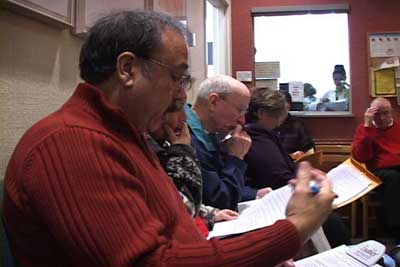Effects of Care Coordination on Hospitalization, Quality of Care, and Health Care Expenditures Among Medicare Beneficiaries
By Deborah Peikes, PhD; Arnold Chen, MD, MSc; Jennifer Schore, MS, MSW; Randall Brown, PhD
JAMA
February 11, 2009
Objective: To determine whether care coordination programs reduced hospitalizations and Medicare expenditures and improved quality of care for chronically ill Medicare beneficiaries.
Interventions: Nurses provided patient education and monitoring (mostly via telephone) to improve adherence and ability to communicate with physicians. Patients were contacted twice per month on average; frequency varied widely.
Main Outcome Measures: Hospitalizations, monthly Medicare expenditures, patient-reported and care process indicators.
Results: Thirteen of the 15 programs showed no significant (P<.05) differences in hospitalizations; however, (one program had fewer hospitalizations and another had more). None of the 15 programs generated net savings. These programs had favorable effects on none of the adherence measures and only a few of many quality of care indicators examined. Conclusions: Viable care coordination programs without a strong transitional care component are unlikely to yield net Medicare savings. Programs with substantial in-person contact that target moderate to severe patients can be cost-neutral and improve some aspects of care. http://jama.ama-assn.org/cgi/content/full/301/6/603
And…
The Elusive Quest for Quality and Cost Savings in the Medicare Program
John Z. Ayanian, MD, MPP
JAMA
Editorial (on the Peikes, et al study)
With voluntary enrollment of more than 18,000 participants from all US regions, these 15 programs implemented a varied set of approaches to improve care coordination. Common features of the programs included the use of nurses trained as care coordinators to interact on a regular basis with patients who had serious chronic health conditions. These nurses provided patients with health education and sent written reports to their physicians. Participants were substantially sicker than Medicare beneficiaries in general, with much higher rates of cardiovascular disease, diabetes, and chronic lung disease, and correspondingly greater monthly Medicare expenditures before enrollment ($1535 vs $551, respectively). The CMS paid each program a negotiated monthly fee that averaged $235 per participant to provide outreach, health education, and support to these chronically ill patients–and in some cases to their physicians. An independent evaluation of these programs was funded by CMS to assess their effects on quality of care, hospitalizations, and Medicare expenditures in a consistent and rigorous manner.
The financial and clinical results of this careful evaluation were sobering. Only 2 of the 12 largest programs had a statistically significant effect on the annual number of hospital admissions. A hospital-sponsored program in Iowa (Mercy Medical Center) significantly reduced hospitalizations by 17%, with a nonsignificant 9% reduction in Medicare expenditures. In contrast, a retirement center program in Maryland (Charlestown) significantly increased both hospitalizations and expenditures by 19%. When program fees were incorporated in the analysis, total expenditures were 8% to 41% higher (P < .10) in the intervention groups than the control groups for 9 of the 12 largest programs, and no programs reduced expenditures. In the clinical domain, the interventions had only sporadic effects on process measures of quality of care, such as vaccinations, cancer screening, or diabetes services, and had minimal or no effects on patients' functional status and health-related quality of life. Another ongoing Medicare project, the Care Management for High-Cost Beneficiaries Demonstration, is assessing the effectiveness of clinician-directed chronic care management programs. A variety of approaches focused on improving care coordination and home support through patients' own health care practitioners are being tested in 6 sites across the country. Many of these approaches are consistent with new models for patient-centered medical homes that have been endorsed by leading professional organizations in primary care. In addition, CMS is now developing plans to launch the Medicare Medical Homes Demonstration that will pay monthly fees of $40 to $100 per patient to 2000 physicians to coordinate the care of their chronically ill beneficiaries. By involving patients' own physicians in coordinating their care, these programs hold greater promise for achieving better quality of care and possibly cost savings. http://jama.ama-assn.org/cgi/content/full/301/6/668
Most of the leading proposals for health financing reform include magical (sleight-of-hand) concepts that purportedly would reduce health care costs. One of these is disease management, or chronic care coordination, or whatever label you want to give it.
This study adds to many others that confirm that these programs, as currently structured, do not work. A fee (average $235 per patient per month) paid to an entity that hires a nurse to coordinate care (most frequently through two telephone calls per month) does not reduce the rate of hospitalization, does not generate a net savings, and has only a negligible impact on quality.
This does not mean that there is no place for chronic disease management. Many studies have shown that systems with strong primary care infrastructures do provide higher quality care at lower costs. The concept of the patient-centered, clinician-directed medical home is the logical environment for management of chronic diseases. The important difference is that it is the patient’s medical condition that is being managed, rather than management of the funds in a third-party contract designed on a business model that enhances profits. This is not to say that there should be no profits, but the profits should be directed to the portion of the health care delivery system actually providing the care. Pay the medical home to provide the care, not third-party private administrators.
There is still a need to look beyond the sleight-of-hand magical proposals to find solutions to our escalating health care costs. That solution is on the table right in front of the D.C. policy makers, if they’ll only look up long enough to see that a monopsonistic, administratively-efficient, single payer national health program is precisely what would work – for all of us.
